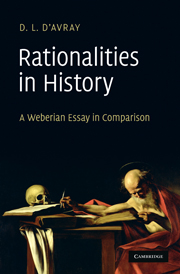Book contents
- Frontmatter
- Contents
- Preface and acknowledgements
- Introduction
- 1 Universal and specific rationalities: theories
- 2 The structure of values and convictions
- 3 Dynamics of values and convictions
- 4 The instrumental–conviction rationality interface
- 5 Formal rationality
- 6 The formal–substantive interface
- Conclusions
- Appendix: rationalities in a case before the Congregation of the Council
- Bibliography
- Index
Conclusions
Published online by Cambridge University Press: 05 June 2012
- Frontmatter
- Contents
- Preface and acknowledgements
- Introduction
- 1 Universal and specific rationalities: theories
- 2 The structure of values and convictions
- 3 Dynamics of values and convictions
- 4 The instrumental–conviction rationality interface
- 5 Formal rationality
- 6 The formal–substantive interface
- Conclusions
- Appendix: rationalities in a case before the Congregation of the Council
- Bibliography
- Index
Summary
The apparently antithetical theories of a universal rationality and of multiple specific rationalities can be brought together within the framework of Weber's value rationality/instrumental rationality distinction. Instrumental rationality is defined here simply as the matching of causes and consequences on a practical and logical level – putting two and two together when values do not deliver definitive answers. Values can shape it: and this is not simply because values are ends or objectives that instrumental rationality serves. Values can also take the form of premises and of side-constraints.
Religious values and other values can be studied together: they seem to work in the same way, insofar as both are resistant to attack on any one front without thereby losing their rational character. This is because the different parts of value systems are mutually supporting, so that the prior probability of any one being right is greatly enhanced by its connection with all the others. Thus an attack on one element flies in the face of antecedent probability – so far as the people whose value is attacked are concerned. The phenomenology of belief in reincarnation is in this respect much the same as that of belief in human rights. Immunity to refutation turns out to be (paradoxically enough) a feature shared by some Enlightenment thought and by Azande magic – it is a very general characteristic of conviction systems. The durability of values is further secured by their concrete character, deriving from experiences or at least from strong mental images.
- Type
- Chapter
- Information
- Rationalities in HistoryA Weberian Essay in Comparison, pp. 185 - 188Publisher: Cambridge University PressPrint publication year: 2010



